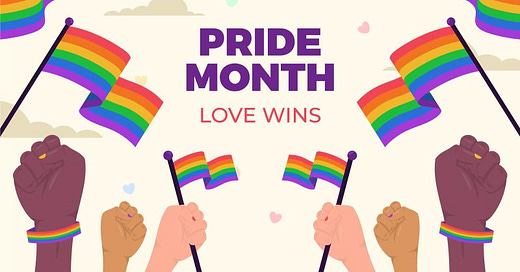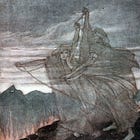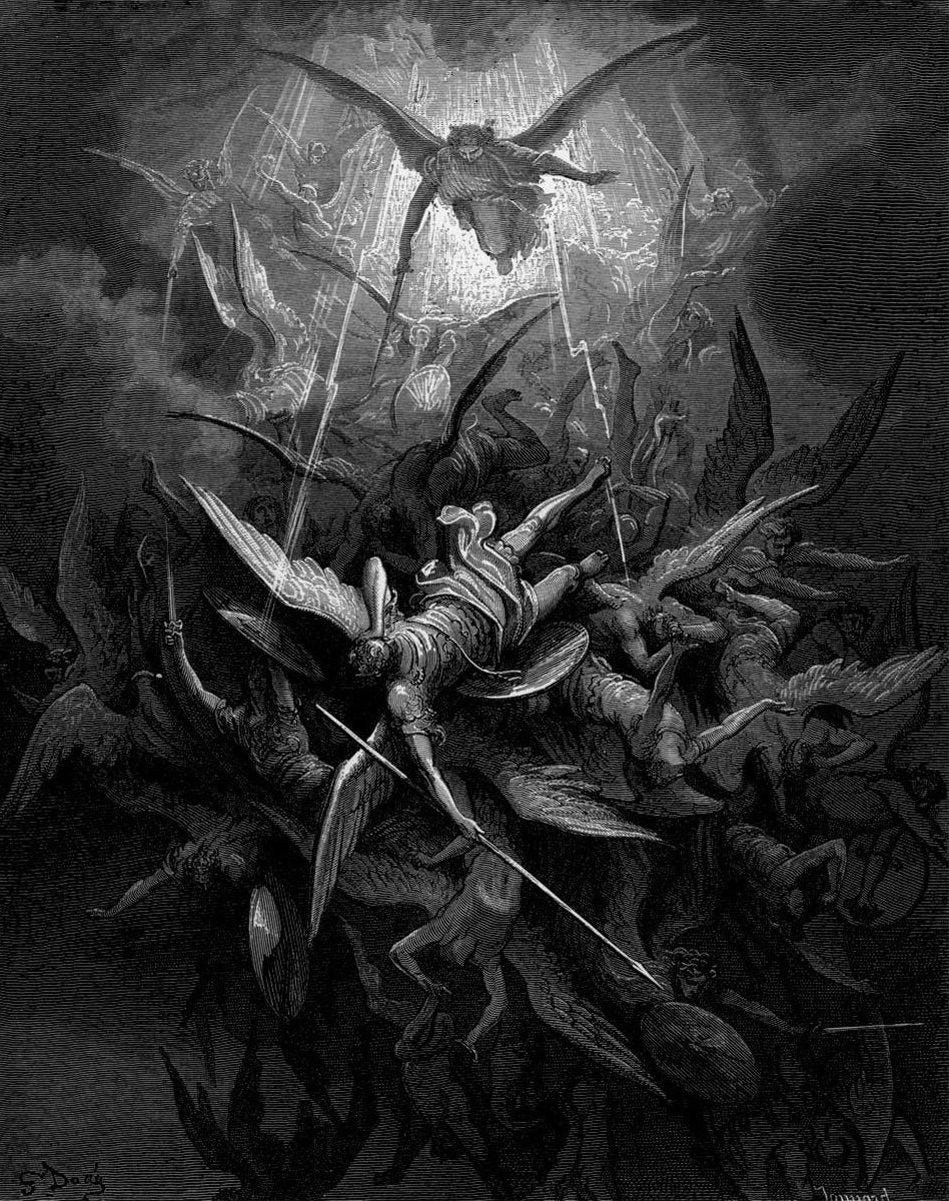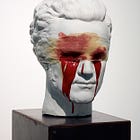After hearing a few street corner preachers ranting about fornication and perversion, you might assume Christians consider Lust to be the deadliest sin. When you finish reading about the latest financial scandal, you could easily put Greed in the top spot. Look at the annual homicide tolls in many American cities, and you could make a case against Wrath.
Each of the Seven Deadly Sins is, as the name suggests, deadly. But for many centuries the greatest theologians have agreed that the deadliest sin of all is the one we celebrate every June — and before you jump to conclusions, no, it’s not that sin.
You may remember, when I was talking about sexual morality, I warned you that the center of Christian morals did not lie there. Well, now, we have come to the centre. According to Christian teachers, the essential vice, the utmost evil, is Pride. Unchastity, anger, greed, drunkenness, and all that, are mere fleabites in comparison: it was through Pride that the devil became the devil: Pride leads to every other vice: it is the complete anti-God state of mind.
C.S. Lewis, Mere Christianity
Within the Christian paradigm, the Creator is immeasurably greater than all Creation. But this idea is not confined to Christianity. Muslims and Jews hold similar beliefs, though they refer to our God the Father as Allah or Ha-Shem, respectively. Many Vedic Hindus credit Brahma with the Creation, while the Lwa of Vodou and Orishas/Orixas of Lukumi and Candomble work for a distant creator God they call Bondye or Olodumare.
In a Created universe, everything happens for a reason. Most philosophical and religious traditions also have an idea of Fate. One’s life is determined from start to finish. Our only freedom lies in the way that we respond to our circumstances, and there’s even considerable debate about that.
Historically, recognizing the limits of our power and working to fulfill the purpose for which we were Created was an important step in our maturity. As Proverbs 9:10 put it:
The fear of the LORD is the beginning of wisdom,
and knowledge of the Holy One is understanding.
But what happens when you reject the idea of a Creator? If God/Allah/Bondye/etc. is not in charge of the world, then who is?
Farewell, happy fields,
Where joy for ever dwells! Hail, horrors! hail,
Infernal world! and thou, profoundest Hell,
Receive thy new possessor—one who brings
A mind not to be changed by place or time.
The mind is its own place, and in itself
Can make a Heaven of Hell, a Hell of Heaven.
What matter where, if I be still the same,
And what I should be, all but less than he
Whom thunder hath made greater? Here at least
We shall be free; th’ Almighty hath not built
Here for his envy, will not drive us hence:
Here we may reign secure; and, in my choice,
To reign is worth ambition, though in Hell:
Better to reign in Hell than serve in Heaven.
John Milton, Paradise Lost
We can argue all day about the existence of Satan, Satan’s ties to Gnostic mythology, or how many fallen angels can dance on the head of a pin. What is important here is not the factual but the truthful. What moments of enlightenment can we spark by meditating upon this old tale that Milton shaped into one of the towering achievements of the English language?
In his Proverbs of Hell William Blake famously claimed that Milton was “of the Devil’s party without knowing it.” But Blake misread the old Puritan. Milton gave Satan the best lines and the most stirring speeches because the Great Deceiver is also the Great Tempter. Readers feel a sense of awe and respect for the devil because he appears to us as an angel of light.
Intoxicated by his own power, Lucifer wages war against God and from there seeks to ensnare others in his misery as Satan. When the proud lose, they work to make sure no one else wins. If Satan’s first sin is Pride, his second and third are Envy and Wrath.
Pride locks us in a prison of self. The proud can only see the Other as a prop in their play or as a mirror in which they can admire themselves. They reign in their world like deposed kings locked in towers. hating the free folk they imagine to be their subjects as they watch them from on high. For these unfortunates, as for Jean-Paul Sartre, Hell is other people.
Pride also locks us away from the humility which might save us. As Satan brags to his imprisoned co-conspirators:
What though the field be lost?
All is not lost—the unconquerable will,
And study of revenge, immortal hate,
And courage never to submit or yield:
And what is else not to be overcome?
That glory never shall his wrath or might
Extort from me. To bow and sue for grace
With suppliant knee, and deify his power
Who, from the terror of this arm, so late
Doubted his empire—that were low indeed;
That were an ignominy and shame beneath
This downfall
Narcissism involves a lack of empathy combined with a desperate need for admiration. Narcissists build their self-image around the adulation of people they see as automatons. They envy those who are more successful and assume all their haters are just jealous. And they are crushed when they are denied the accolades that they know in their hearts they do not deserve.
Narcissistic Personality Disorder (NPD) is one of the Cluster B disorders along with:
Antisocial personality disorder (ASPD): a pattern of disregard for, and violation of, the rights of others.
Borderline personality disorder (BPD): a pattern of instability in interpersonal relationships, self-image, and affects, and marked impulsivity.
Histrionic personality disorder (HPD): a pattern of excessive emotionality and attention-seeking behavior.
In all four of the Cluster B disorders, we see a profound disjunct between the sufferers and their social world. Other people can be prey, they can be fans, they can be props or obstacles. But they can never be anything but objects. The Other is something to be used, an It rather than a You.
Depending on whom you ask, between 1% and 6% of the population suffers from at least one Cluster B personality disorder. That means anywhere between 3.3 million and 20 million Americans have as their hamartia a serious difficulty in relating to others as fellow human beings.
Once starstruck young people traveled to Hollywood to become celebrities. Today anybody with an Internet connection can become an influencer. All the world’s a stage, and we have an entire generation of players seeking an audience.
Attention is the coin of the internet realm. To get that attention some seek makeup, accessory, and political tips from their favorite influencers. By wearing their clothing and aping their opinions, fans hope that some of that celebrity will rub off on them. Sympathetic magic has existed since prehistoric times.
For pubescent girls, there is enormous pressure to fit in by being “sexy.” This has been the case since the Sexual Revolution if not before. But the Swinging 70s didn’t have Instagram thots and sugar baby websites. And while their male classmates may have learned everything they knew about sex in the locker room, at least they weren’t learning it from a steady supply of rough anal and choking videos on Pornhub.
This social pressure has led many youths to make regrettable sexual choices. Pride leads to Lust, joyless copulation performed because that’s what everyone else is doing. Pride also leads many incels to bitter rants against the women who cruelly refuse them the sex they deserve, reserving it instead for “Chads” of superior height, wealth, and hygiene.
On March 18, 1986 the New York Times ran an op-ed from noted intellectual William F. Buckley suggesting that AIDS-carriers be tattooed on their arms so they could be spotted. For added efficacy, Buckley recommended they also be tattooed on their buttocks so their prospective bathhouse partners would know in advance. 29 years later, the Supreme Court’s 2015 Obergefell vs Hodges made same-sex marriage legal throughout the United States.
Today a significant majority of Americans couldn’t care less what consenting adults do in their own spaces, and most are fine with or at least resigned to gay marriage. We’ve come a long way since the AIDS crisis, certainly further than any gay man attending the week’s third funeral could ever have imagined in 1986. Many non-heterosexuals were and are quite content with this state of affairs and settled into lives of quiet domesticity amongst their neighbors.
But the last thing Pride wants is to be a respected member of society. Pride must be exceptional. And so we have seen explosive growth in gender deviance and in a laundry list of sexual identities that give their bearer a name, a purpose, and a flag. Why be boring and normal when you can be the center of attention?
But tolerance is a tricky thing. The LGBTQAI+ Pride militia had to bring sexually charged books and twerking drag queens into children’s libraries to get a rise out of parents. Adult Baby Diaper Lovers (ABDLs), “Littles”, and other fetishists are continuing to push that limit. Once the world grows inured to their antics, it’s hard to imagine what the Pride warriors will do next to shock and offend.
Many troubled people find an audience, or at least a circle of friends, by declaring themselves members of some identity or another. Once they find their gender, sexual orientation, fursona, etc., they declare themselves persecuted by a larger world that refuses to recognize them or is simply more successful at life than they are.
And when they aren’t arguing with their enemies, they’re sniping amongst themselves. As C.S. Lewis noted in Mere Christianity:
Other vices may sometimes bring people together:
you may find good fellowship and jokes and friendliness
among drunken people or unchaste people.
But Pride always means enmity — it is enmity.
Being Deadly Sins, neither Lust nor Pride can ever be sated. Pronouns must be respected, identity acknowledged, and sexual urges fulfilled by attractive partners. It’s not enough that they are allowed to be special and different without harassment or persecution. The world must also celebrate their specialness and their difference. And, of course, the world inevitably fails to live up to their expectations or release them from their sad and lonely prison.











For a couple decades now, I've been saying -- sometimes whispering, sometimes shouting -- that a "Pride" parade of any sort is a one-way ticket to the abyss. It's not just the narcissism and raw hubris that seals your fate. It's a matter of externalized self-regard, the focused satellite view of Self which renders everything else more dim and distant than the farthest star. Pride doesn't just go before a fall. Pride doesn't know when it's falling, because there isn’t anything else to compare itself to.
Very well said. this is a compelling theological piece. if you're not familiar with John Cassian's "Conferences," Evagrius of Ponticus' "Prakticum", and Buber's "I and Thou" I think you might find them useful. there's a conversation to be had between this piece and these other theologians. One thing I find that you hint at is that pride does love to walk with vainglory...